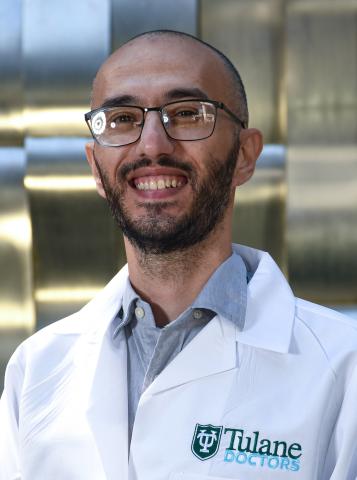Yazan Juma, M.D.
Assistant Professor

Education & Affiliations
Biography
Dr. Yazan Juma received his medical degree from the University of Jordan School of Medicine in Amman, Jordan. He completed his pathology training at the MedStar Georgetown University Hospital in Washington, D.C. Dr. Juma completed fellowship training in surgical pathology at Virginia Commonwealth University in 2025. He is board-certified in anatomic and clinical pathology by the American Board of Pathology.
Specialty Certifications
2024: Anatomic and Clinical Pathology, American Board of Pathology
Faculty Appointments
2025-present: Assistant Professor, Tulane University School of Medicine, New Orleans, LA
Publications
Nidhi Vantair, Maria Leising, Matthew Najor, Yazan Juma, Dong Hyang Kwon, Bhaskar Kallakury, Alexander Gilbert, Jennifer E Verbesey, Maria E Rodrigo, Farooq H Sheikh, Alaa Ali, Anne Renteria, Matthew Cooper, Sandra Rosen-Bronson, Olga A Timofeeva. MedStar Georgetown University Hospital, Washington, Predicting the success of antibody removal with therapeutic plasma exchange: The role of serum dilutions. PMID: 40158661
C. Vandenburgh, Y. Juma, A. Jain, J. Vucci, A. Gilbert, J. Verbesey, S. Rosen-Bronson, B. Dale, M. Niemann, O. Timofeeva. Georgetown University School of Medicine, Washington, DC, Medstar Georgetown Transplant Institute, Washington, DC, MedStar Georgetown University Hospital, Washington, DC, PIRCHE AG, Berlin, Germany. DRB1 Molecular Mismatch Load As a Predictor For DSA-free Survival In Living Donor Kidney Transplants.
Selvaraj Muthusamy, Patrick Memari, Yazan Juma, Elizabeth S Barrie, Vernell Williamson, Andrea Ferreira-Gonzalez, Raghavendra Pillappa, Valentina Robila. Virginia Commonwealth University , Richmond, VA. Concurrent STK11 and TP53 Mutations Correlate with a Unique Morphological Phenotype and Clinical Stage in Lung Adenocarcinomas.
Yazan Juma, MD; Bhaskar Kallakury, MD, DongHyang Kwon, MD, Olga Timofeeva, Ph.D., F(ACHI). MedStar Georgetown University Hospital, Washington, DC, MedStar Washington Hospital Center, Washington, DC. De novo anti-HLA donor-specific antibodies not diagnostic for ABMR are associated with a higher risk of persistent/recurrent TCMR and graft dysfunction in kidney transplant patients.
Awards & Recognitions
Dr. Yazan Juma, who joined the Pathology Department this year as the Hematopathology Fellow, has been appointed to the faculty as a Clinical Assistant Professor. He received his terminal degree from the University of Jordan School of Medicine in Amman, Jordan, in 2015. In Amman, he completed a Postgraduate Clinical Internship in 2016 at the Prince Hussein Hospital and received his Permanent General Practitioner License from the Ministry of Health at Amman in 2017. From 2019—2020, Dr. Juma served as a Hospitalist in Surgery at Istishari Hospital in Amman and later became a resident in Pathology at MedStar Georgetown University Hospital in Washington, D.C. for the next four years, where he also served as the Resident Medical Education Director. Following his residency, Dr. Juma completed a fellowship in Surgical Pathology at Virginia Commonwealth University Hospital Systems and began a Hematopathology Fellowship at Tulane University in 2025.
Board Certified in AP/CP, he is a member of the College of American Pathologists and the American Society for Clinical Pathologists.
